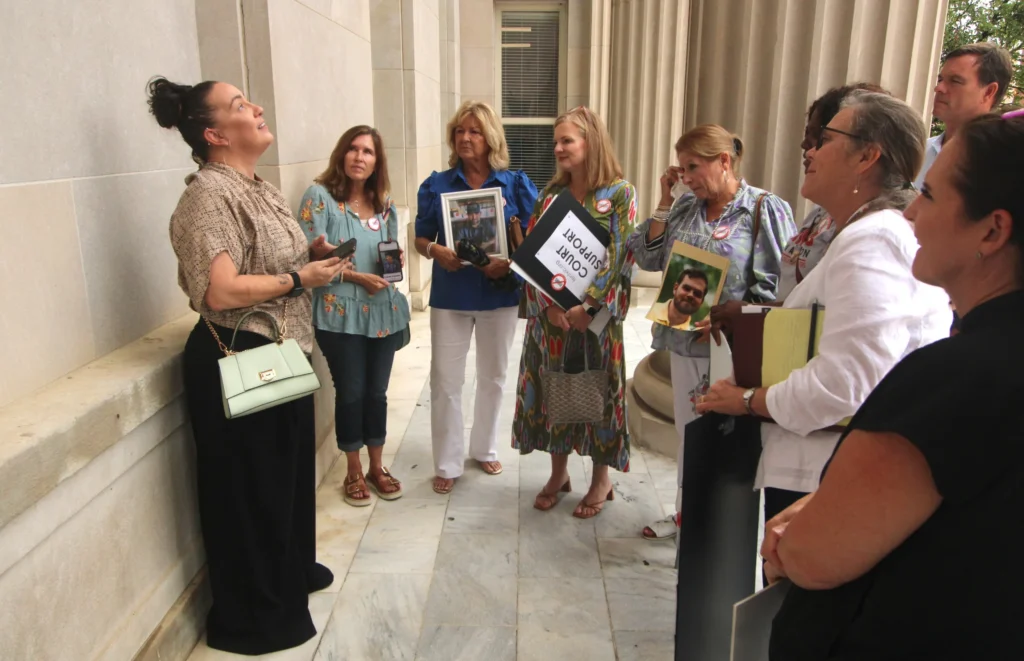Read the original article and view the pictures on the Wilson Times website.
A Wilson man received more than five years in prison after pleading guilty in the county’s first death by distribution case, following the fentanyl overdose death of a 25-year-old Navy veteran.

A Wilson man was sentenced Monday to an active term in state prison after pleading guilty to the first death by distribution case to be adjudicated in Wilson County.
Tabron Tyrone Farmer, 35, of the 5100 block of Wilson Road, made an Alford plea July 29 to death by distribution in the June 25, 2023, death of 25-year-old Shade Izayah Anthonee Staples. An Alford plea is an arrangement in which the defendant doesn’t admit guilt but acknowledges there is likely enough evidence to ensure a conviction
In Wilson County Criminal Superior Court on Monday, Resident Superior Court Judge L. Lamont Wiggins sentenced Farmer to a minimum of five years and seven months to a maximum of seven years and nine months active in the North Carolina Department of Adult Corrections.
Farmer is the first person to be sentenced in Wilson in a death by distribution case since modifications in the death by distribution law were ratified in September 2023, providing for stiffer sentences for defendants who unlawfully deliver certain controlled substances that proximately cause a person’s death.
Assistant District Attorney Kristen Spainhour told the court that on the date of his death Staples had consumed three beers at Brewmasters at lunchtime, at which time he called Farmer asking to purchase Percocet pills.
Spainhour said Staples walked to a nearby store to meet Farmer. Staples purchased two blue pills from Farmer. Spainhour said the transaction was captured on video, adding he thought he was purchasing Percocet.
Spainhour told the court that the defendant called the victim shortly thereafter saying that he thought he had given him the wrong package, that he “thought he messed up.”
At 2:22 p.m. on the date of his death, family members noticed that Staples’ speech was slurred while he was playing a video game with his sister, Spainhour said. Staples “slumped over on the couch” and was not moving and his eyes had rolled back, Spainhour told the court.
First responders could not revive Staples despite giving him the overdose reversal medication naloxone.
Spainhour said fentanyl was determined to be the cause of death.
Spainhour said the victim’s family was “devastated” by the loss.
Defense attorney Andrew Boyd told the court that his client pleaded guilty as a result of a plea arrangement in which lesser charges were dismissed.
Boyd told the court that Farmer has 12 children, is married and that his wife was in court for the sentencing.
“There is nothing we could say that would bring Shade Staples back,” Boyd said.
Farmer was ordered to pay $2,975 in counsel fees to attorney Boyd.
Wiggins revoked Farmer’s bond and ordered him taken into custody.
STAPLES A NAVY VETERAN
After the sentencing, Staples’ mother, Taira Gandarilla, formerly of Wilson and now residing in Knightdale, told the Times that her son was a Navy veteran.
“It is kind of bittersweet,” Gandarilla said. “Regardless of the outcome, it’s not going to bring Shade back, but it is very rewarding as a mother to know that even though my son sacrificed his life, we can definitely prevent somebody else from losing their life as a result of this young man’s carelessness.”
Gandarilla said it was comforting to her that other parents of Fentanyl overdose victims were in the courtroom at the time of the sentencing.
Ten families of Wilson County fentanyl overdose victims were present in the court for Monday’s hearing.
Gandarilla said that until Monday, she did not know this group existed.
“You guys didn’t know me from Sunday, and to know that I already have a family is incredibly comforting,” Gandarilla said. “You can go through therapy all day long, but the best therapy is to go through it with people who have walked in your shoes. We have than commonality that is going to forever bond us.”
Gandarilla said her son was “first and foremost a brother.”
“Shade absolutely coveted the relationship that he had with his sisters. He was the oldest of four siblings. He had three younger sisters, and those were his girls. He was incredibly family oriented. He was an old soul. For a 25-year-old man, he literally saw the world differently than anybody else I had ever met. He just saw things from a different lens. He was always asking questions. He wanted to learn as much as possible every single day.”
Two other death by distribution cases are pending in Wilson County.
Wilson County has had 151 fentanyl fatalities since 2013, according to Barb Walsh of the Fentanyl Victims Network of North Carolina. She was with parents of overdose victims who were at the courthouse.












